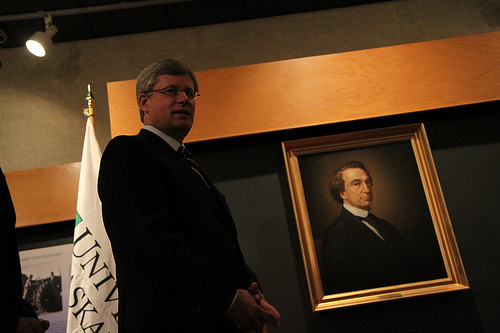By Emily Gorner (Contributor) – Email
Print Edition: March 6, 2013
It may not be a fighter jet, or a $16 glass of orange juice, but the Harper Government’s new Office of Religious Freedom is bound to cause some disagreement among Canadians. The general reaction seems to be quite reproachful; Christians and atheists alike are questioning where the money for the office is coming from, and if it’s worth the cost.
Although these are legitimate concerns, I think the main problem with the new office is presented clearly in its placement within the foreign affairs department. That’s right, the new office is not aimed at promoting religious freedom here at home, but at promoting Canadian “values” abroad. The mandate states that the office will “promote Canadian values of pluralism and tolerance.” When I hear any politician speak about promoting our values elsewhere, all I can think is: call me crazy, but I think other countries might already have their own set of values. True, there is violence in foreign countries due to religious differences, but it seems questionable that there should be a specific office dedicated to religion, when our foreign policy is already focused on equality and human rights. An office specific to religion has foreign intervention written a little too blatantly on it.
There is also some concern for the fact that Harper himself is a Christian, and this office may be a show to impress his conservative, right-wing voter base. This concern will be put to the test soon, as there has been a call for the new office to send their ambassador, Andrew P.W. Bennett, to Tibet. A recent plethora of self-immolations in protest of the Chinese government, including protesters as young as 17, has been attributed to religious oppression. However, the issues in Tibet are also very political, beyond simple religious discrimination. While the Harper government is getting very cozy with the Chinese government over trade deals, whether or not they send Mr. Bennett will reveal just what this new office is about.
Whether or not this office turns out to be a purely rights-based effort, or a politically-motivated show of Harper’s commitment to Christianity, it will still cause concern that the money being spent on the office could be spent on other things more beneficial to Canadians. While the circumstances in Tibet are tragic, it seems unlikely that Mr. Bennett will make much of a difference in a political struggle that has been going on for upwards of 100 years.
While our government is paying for this new office to promote Canadian values elsewhere, freedoms and beliefs are being shoved under the rug at home. The pipeline company Enbridge forges on with its plan to build the Northern Gateway Pipeline, despite cries of outrage from First Nations bands all across the territory which the pipeline will cross. In fact, the Coastal First Nations group has been forced to withdraw from upcoming hearings due to a lack of funding. Is protecting natural habitats not a huge part of the First Nations’ spirituality? Is that spirituality in itself not considered a religious minority? Until the Harper government is willing to recognize all religious minorities—especially the ones still struggling within Canada—the Office of Religious Freedom will appear as a federally-funded missionary group that only recognizes freedom to its own religion as a basic human right.


